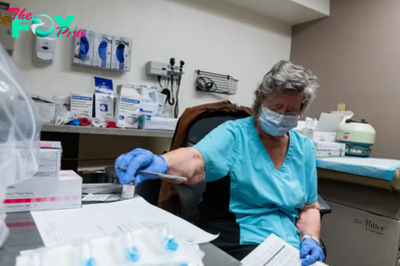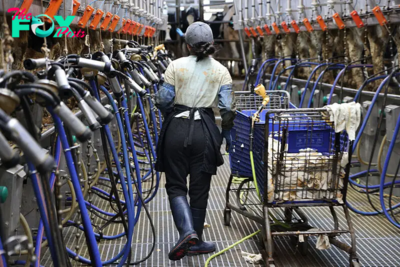Health
Get Ready for a Catastrophic Four Years for Public Health
Donald Trump may only be president for another four years, but the impacts of his administration on public health could be catastrophic for a long time to come. While we don’t know exactly what will happen, there’s no doubt the next four years could see attempts to curtail the authority and autonomy of federal health agencies like the U.S. Food and Drug Administration (FDA) and the U.S. Centers for Disease Control and Prevention (CDC)— something that the President-elect tried during his first term. However, despite Trump’s bravado around letting RFK Jr “go wild” and “do what he wants” on health, it’s unlikely that sweeping closures or reconstructions of federal agencies will be feasible. A more fundamental issue is the likelihood that another Trump term could further undermine scientific regulatory authorities—turning the cracks in public trust that his first administration helped cause into veritable chasms.
The concern is not just about what the Trump 2.0 Administration will do, but also about what it will say. RFK Jr., one of the so-called “Disinformation Dozen,” was already the most iNFLuential figure of anti-vax movements. Now, it looks as though he will have the ear of the president. The culture of conspiracism will likely cascade through and beyond government, with well-known misinformation-mongers being rumored to be in line for top Health roles. For instance, Dr. Joseph Ladapo, the Florida Surgeon General, is rumored to be in the running to lead the U.S. Department of Health and Human Services. The fact that people who espouse views that deviate far from the scientific mainstream are being considered to head some of the most revered institutions is a sign of how contrarian or cavalier a Trump 2.0 administration could be when it comes to public Health. Rather than its promise to “Make America Healthy Again,” the new Trump administration could end up leaving America—and the world—sicker than before.
Spreading vaccine hesitancy
Vaccines are some of the most successful public-health interventions in history, saving at least 154 million lives in the past 50 years. If Trump’s record is any indication, he himself may not really be the problem when it comes to vaccines. In the years of his first administration, vaccine coverage was as high as—or in some cases the highest—it had ever been (although this was more a continuation of the upward trajectory rather than a result of any particular Trump policies). Childhood vaccination rates have since slipped in the U.S. And with a second Trump term and the worrying prospect of people like Kennedy and Lapado steering or at least influencing policy, it is hard to imagine that vaccine rates won’t further decline. Certainly, vaccine hesitancy will increase—an intensification of the trend we have been seeing, in the U.S. and globally, since the start of the pandemic.
There may not be outright vaccine bans. “"I'm not going to take away anybody's vaccines,” Kennedy recently said. The problem is the doubt that Kennedy sows. Misinformation lingers. It’s been more than 25 years since Andrew Wakefield published his fraudulent paper falsely linking the MMR vaccine to autism. However, his shadow still looms large, and the U.S. has already been experiencing recent measles outbreaks, with misinformation-driven vaccine hesitancy a key factor. Globally, unfounded autism fears are still cited as a reason why some parents refuse vaccines for their children. Kennedy has made false claims that vaccines cause autism, and his misinformation super-spreading has even been linked to a deadly measles outbreak in Samoa in 2019 (for which Kennedy has denied responsibility).
Read More: What Donald Trump’s Win Means for Abortion
The U.S. currently recommends updated COVID-19 vaccines to all. In this sense, the U.S. is more favorable to maintaining widespread immunity than most other countries globally. But it is hard to imagine that this level of official support for additional COVID-19 vaccines will continue next year.
Some of the most at-risk vaccines are perhaps those for HPV. Kennedy has spread misinformation about the HPV vaccine Gardasil, including unfounded claims it is linked to autoimmune conditions. Falls in HPV vaccine coverage would be a travesty for public health, since they help reduce the risk of cervical cancer by up to 90%.
The Wild West of “wellness”
Kennedy and his followers claim, falsely, that numerous vaccines and medicines haven’t been sufficiently tested for safety. Let’s be clear: COVID-19 vaccines, HPV vaccines, and all others that are approved and recommended in the U.S. and globally are safe and effective. But more research and testing is never a bad thing—so scaling back organizations like the CDC and the NIH (like Kennedy wants) would hardly help make the market for medicines and Health products safer.
Then there’s fluoride. Trump has said that Kennedy’s idea of banning the addition of fluoride to some public water supplies—a longstanding practice that improves dental Health—“sounds ok.” Although it’s not been without controversy, organizations including the CDC and the World Health Organization have stated that fluoride in drinking water can help prevent cavities and is safe within certain limits. But this issue could portend what officially recommended public-Health measures may be removed or undermined, and what alternative wellness remedies may take their place.
Kennedy has suggested that he will stop the FDA’s “war” on things including ivermectin, hydroxychloroquine, psychedelics, nutraceuticals, and even sunshine. Like Kennedy, Ladapo encouraged the use of ivermectin (an antiparasitic treatment primarily used by veterinarians) and hydroxychloroquine, both of which have been debunked by the medical community. As his former running mate, Nicole Shanahan may follow Kennedy in playing a prominent role in shaping Trump’s health agenda. Like Kennedy, Shanahan is known for amplifying unscientific claims, including the dangerous claims that sunscreen is harmful and unprotected sun exposure can heal numerous conditions.
Read More: What a Second Trump Term Means for the Constitution
There may be some positive public-health outcomes during the coming Trump years. The ambition to reduce the amount of processed food in the U.S. diet, and especially the number of additives and artificial ingredients in children’s diet, is an important one. However, there are better ways to achieve this than undermining public confidence in the FDA and other health agencies. Better regulation of the junk food industry, investing in health education, and making healthy, natural alternatives more affordable, especially for those on low incomes, would be a better approach.
It is likely that such high-level advocacy of scientifically unproven, alternative treatments could mean that a Trump administration sees the continued rise of “neo-quackery” and “conspirituality” (when conspiracy meets spirituality) under the banner of ‘wellness’. Misinformation spreads like a virus, and it is perhaps no surprise that some of those who have proven to be instrumental in Trump’s win are at the forefront of the media which is most susceptible to the spread of misinformation, from Elon Musk’s X to Joe Rogan’s podcast.
Neglecting the next pandemic
In an interview with TIME, Trump indicated he would likely disband the Office of Pandemic Preparedness and Response Policy, an executive office set up by the Biden Administration to prepare for future outbreaks. Doing so would be a dangerous move. Several countries, including the U.K. and Australia, are conducting pandemic inquiries and finding that more and better preparation is required, not less.
H5N1 continues to spread among U.S. cattle, and with each infection the risk of spillover into humans grows. The current administration has been severely lacking in terms of its surveillance of the virus amongst dairy cattle, and in terms of ensuring that those in close contact with infected herds have and are using personal protective equipment. However, things are unlikely to get better in the coming years.
Read More: Giving Up on Climate Action in a Second Trump Term Isn’t an Option
Kennedy has actively promoted drinking raw milk—a dangerous practice for all kinds of reasons, including that it’s a potential risk factor for human H5N1 infection. Of deeper concern is the fact that the Trump Administration may undo some of the recent Biden-Harris initiatives designed to tackle the growing H5N1 threat.
A broader problem is that the American protectionism at the heart of the MAGA ethos can only go so far to actually protect the country from global disease threats. Whether it is H5N1, mpox, Middle East Respiratory Syndrome (MERS), or a significantly mutated and more immune-resistant COVID-19 strain, the best way for any country to protect its people is to try to tackle outbreaks at the source. This requires support, resources, and cooperation at the global level through agencies like the World Health Organization, which Trump will almost certainly scale back.
These are just three of the areas of public health that could be hit over the next four years. There are many more. Although it may not have turned out to be quite as much of a vote-determining issue as initially thought, abortion and women’s reproductive health are a looming concern for many. So too is the prospect of another four years in which Trump may pick up where he left off on trying to erode the Affordable Care Act and cut funding Medicare and Medicaid.
There’s plenty to anxiously await as Trump, Kennedy and their acolytes sink their teeth into public health.
-

 Health1d ago
Health1d agoCOVID-19’s Surprising Effect on Cancer
-

 Health1d ago
Health1d agoColorado’s pioneering psychedelic program gets final tweaks as state plans to launch next year
-

 Health2d ago
Health2d agoWhat to Know About How Lupus Affects Weight
-

 Health4d ago
Health4d agoPeople Aren’t Sure About Having Kids. She Helps Them Decide
-

 Health4d ago
Health4d agoFYI: People Don’t Like When You Abbreviate Texts
-

 Health5d ago
Health5d agoKnee problems tend to flare up as you age – an orthopedic specialist explains available treatment options
-

 Health5d ago
Health5d agoThe second Trump presidency could mean big changes for health insurance in Colorado
-

 Health5d ago
Health5d agoIs It Time to Worry About Bird Flu?



















